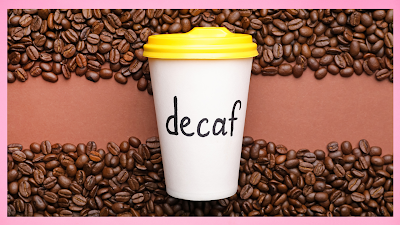Decaffeinated Coffee: Facts You Will Love to Know
Decaf Coffee, Facts and Myths
Worried about too much caffeine intake as you are a coffee lover like me? Perhaps you are wondering to limit your caffeine as you are facing some health issues. So have ever thought about buying decafe coffee from the grocery?
Let’s talk decaf! You know, that often misunderstood,
sometimes mocked cousin of regular coffee. But fear not, decaf lovers, it's
time to give this caffeine-free brew the respect it deserves.
Decaf: More Than Just a Buzzkill
For years, decaf has been unfairly labeled as a
watered-down, flavorless version of its caffeinated counterpart. But let’s
clear the air. Decaffeinated coffee is a complex and delicious beverage in its
own right. It's perfect for those who love the rich aroma and taste of coffee
but prefer to skip the jitters.
How Does Decaf Actually Work?
You might be wondering, “How do they even make
decaf?” Great question! There are a few different methods used to remove
caffeine from coffee beans, but they all share the same goal: to preserve the
coffee's flavor while bidding adieu to that pesky stimulant.
- Swiss Water Process: This method uses water to extract caffeine from green
coffee beans. It's considered one of the cleanest and most
flavor-preserving processes.
- Carbon Dioxide Process: This method involves exposing green coffee beans to
carbon dioxide gas under high pressure. The gas pulls out the caffeine
while leaving the flavor intact.
- Ethyl Acetate Process: While less common, this method uses ethyl acetate (a
natural substance found in fruits) to remove caffeine.
Decaf: It’s Not Just for Night Owls
Sure, decaf is a popular choice before bed, but it's so much
more than a sleep aid. Many people enjoy decaf as their daily brew because
they're sensitive to caffeine or simply prefer a calmer, more focused
experience. Plus, decaf contains several antioxidants and other beneficial
compounds, just like regular coffee.
Decaf Myths Debunked
Let’s bust some common misconceptions about decaf:
- Decaf
is flavorless: This is simply not true. High-quality decaf coffee can
be just as flavorful and complex as regular coffee.
- Decaf
is unhealthy: Decaf coffee contains many of the same beneficial
compounds as regular coffee, including antioxidants.
- Decaf
still has caffeine: While it's true that a tiny amount of caffeine
remains in decaf, it's typically less than 3 milligrams per cup – not
enough to cause any noticeable effects.
Choosing the Perfect Decaf for You
With so many decaf options available, finding your perfect
cup can be a fun adventure. Consider these factors when choosing a decaf:
- Roast
level: Light, medium, or dark? Your preference will influence the
flavor profile.
- Bean
origin: Different regions produce coffee beans with unique
characteristics.
- Brewing
method: Experiment with different brewing methods to find your
favorite decaf experience.
So, the next time you're craving the comforting warmth of a
cup of coffee without the caffeine buzz, don't hesitate to reach for the decaf.
It's time to embrace the delicious world of caffeine-free coffee!



No comments